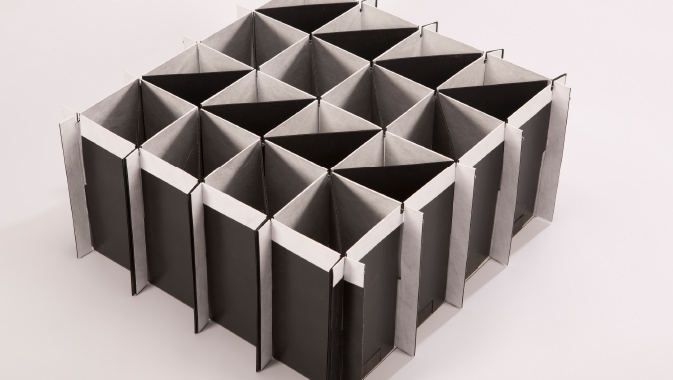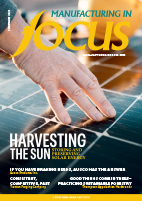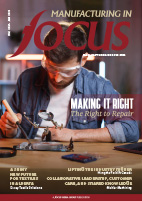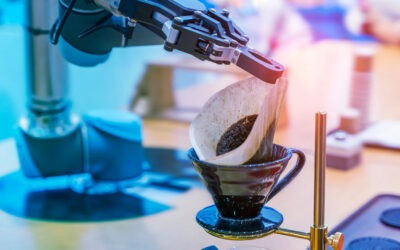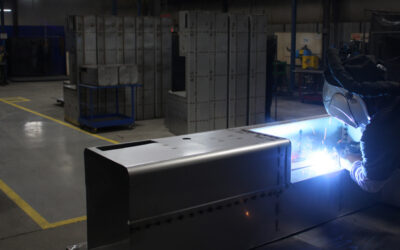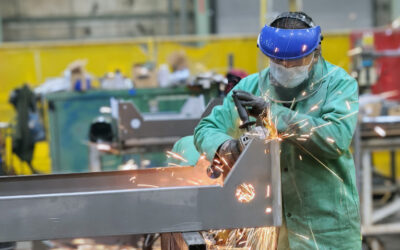The single-use cardboard box has just become the most archaic form of packaging on the planet. Thanks to Amatech’s returnable packaging alternatives, diverse industries and consumers can now take control to reduce waste around the world.
~
This industry leader becomes an extension of manufacturers’ engineering departments to provide the most cost-effective, quality returnable packaging solutions that are unique for each product. The company that started out as one man who could “do everything with a #2 pencil, an eraser, and an Exacto knife,” has evolved into a high-tech specialist with all the latest technology needed to create the most complex reusable packaging design and manufacturing.
The difference that this brilliant industry resource is making in the world has the potential to be huge because, even though everything from how we brush our teeth to how we travel has been modernized, packaging has fallen desperately behind the times. Amatech is the industry resource for anyone looking to implement returnable packaging into their supply chain.
The company is educating the world on better, more sustainable ways to package goods; easing the environmental pressure caused by cardboard manufacturing and waste; and saving industries millions of dollars in damage prevention and waste. From its headquarters in Erie, Pennsylvania, the company provides fast turnaround times on quoting and prototyping, and no customer leaves without a solution. Its customer satisfaction rate is so high that the company was awarded Woodbridge Group’s supplier quality award in 2015 in recognition of going far beyond the regular levels of service delivery and quality.
Saving the planet is incredibly hard work. It takes much education and even more action to create enough awareness to get industry leaders to sit up and listen. Luckily, there are always early adopters to lead the way, and in this instance, the American automotive industry and the appliance, agriculture, aerospace, electronics, and pharmaceutical sectors are innovating and modernizing in a bid to make reusable packaging a global norm. Thanks to participating manufacturers, the days of sending insane amounts of cardboard to landfill are nearing the end.
This is happening because Amatech has stepped in to make this more sustainable choice a reality that is affecting the entire supply chain positively. Instead of returning empty delivery trucks to their point of origin, reusable packaging can now be sent back to parts manufacturers to be filled with the next order.
The company has come up with a host of durable, reusable plastic packaging solutions custom-designed for specific applications. Its plastic boxes, totes, and other containers protect contents much better than cardboard does, and manufacturers are reporting much lower losses due to damage in transit.
Surprisingly, the educational process can be tough. However, with the full support of its expert team, Amatech guides industries in making the change from single-use to reusable packaging in a cost-effective way.
“We fill a huge gap in the market because our customers can really rely on our expertise and overall process,” says Hallie Riefstahl, Marketing Manager since 2017. “We consistently strive to communicate with our potential and existing clients in order to further solidify our presence as the industry resource.”
Company President David Amatangelo agrees. “Packaging training centers all teach how to package absolutely anything, but [many don’t focus] on returnable packaging… Automotive is a great example of an industry that has utilized returnable packaging for the past twenty years, and many other industries have come on to the scene in the past decade. We are pleased that we can offer our products to many industries across various spectrums of business,” he says. Indeed, the company’s smart solutions are making a huge difference in a variety of sectors including aerospace, agriculture, appliance, automotive, cabinetry, disaster relief, electronics, material handling, pharmaceutical, and retail/food.
Because so little is known about returnable packaging, Amatech is the industry’s go-to resource. “For us, sustainability isn’t just a word. It is a movement that can and is changing the planet,” says Hallie. Everything from off-cuts to foam is recycled at the company’s facility.
“We completely replace cardboard boxes in supply chains. We’re a one-stop shop that provides everything from inception to engineering, right down to the delivered product,” says Jason Amatangelo, Director of Business Development. As a result, suppliers and manufacturers can now set up closed-loop systems in which parts are delivered to their facilities and the previous load of containers can be collected, all in one go.
“Most manufacturers are only focused on their product and not on the packaging or the effect it has on the environment. When that changes, the savings begin,” Jason adds. He spends a lot of time in the field, consulting with customers and rethinking their packaging methods. A big part of his contribution at Amatech is showing companies what incredible savings lie at the other end of the outdated world of cardboard packaging.
It is not always as simple as just changing two or three things. Often companies need to introduce a whole new approach to dealing with the packaging process. “There are important questions to address, like how does the change affect quality? One also has to consider how it will change how and when people handle the product,” he says.
Another point for consideration is that even though it is ‘only’ the packaging, Jason reckons that it is surprising how many departments upstream are affected by such changes. All of these must be considered before implementation to ensure a successful result and an optimized supply chain. His forte is in navigating the change by working with the engineers and other teams to help make it all a reality.
Amatech’s engineers are dedicated to the ongoing development of methods like 3D printing and enhanced materials to keep the company’s partners ahead of the latest packaging trends. Once a customer’s needs are established, Amatech’s prototyping department produces a life-size prototype of the suggested packaging design. This allows clients to interact with and test the product before they commit to large-scale ordering. From here, the production of the best-suited product protection can begin.
The father-and-son duo of David and Jason works seamlessly with the rest of the team. When David got into the business, he was working for an injection mold automotive part manufacturer and knew nothing about packaging. One of his employer’s biggest clients, Chrysler Alabama, requested that returnable containers be implemented. The client contacted this company’s engineering department informing the team that it will be using totes instead of cardboard boxes, and of course, the customer’s wish was honored.
David was the plant manager at the time, and the company manufactured hundreds of different parts for Chrysler. Until then, everything was shipped in cardboard boxes, and the company had over 25,000 square feet of warehouse space dedicated to packaging. David realized that storing the same quantity of plastic totes would require over 200,000 square feet of storage, unless they could store flat.
He researched and found a type of plastic with a seam that acted exactly like a hinge, allowing it to lock down perfectly. He patented the system and presented it to his company, which bought a large number of his new totes. David quit his day job and started manufacturing reusable plastic boxes full time. The process was time-consuming, and he had a lot to learn – from the industry names of standard-sized cardboard boxes to which plastics were best.
He started in his basement, worked his way into the garage, and eventually had to rent a small facility. He grew the business from here. “Jason was still at school back then, but he used to help me by putting Velcro onto the flaps. It really was a classic case of the founder knowing absolutely nothing. I had to learn everything from scratch,” says David.
For him, motivation means letting people do what they are best at, and micromanagement is counterproductive. “Nothing would ever get done if we constantly controlled every process,” he says. The staff has a really good commission structure, and his belief in their passion for the industry goes an incredibly long way – something that Hallie confirms. “David’s trust in us also makes him a very good listener. Our management team gives us the freedom in which to really run with good ideas and make the best of them,” she says. Of course, this also contributes to an incredible team spirit, and the folks at Amatech do not let grass grow when it comes to achieving their annual goals. Thanks to the company’s great management style, this team is a solid one.
“If I wouldn’t invite someone to dinner at my home, they won’t be a good fit for our team,” says David. In this way, candidates are vetted to fit into and enhance this very positive work environment, and the method has stood the company in good stead. “We wouldn’t be where we are today without our fantastic team. There’s no way I could have done this all by myself. It’s impossible,” he says. Rounding out the management team are Richard Bittner, VP of Engineering, General Manager – Columbus, and Tony Amatangelo, Executive Vice President.
Some of the company’s greatest moments came when it received a U.S. patent for the plastic hinge that mimics the folds in cardboard boxes, as well as its numerous customer awards for quality, delivery. David has even received an award from an employee, which has pride of place on his office wall.
With its keen awareness of the work of others,’ the company is a generous supporter of local and national charities such as The Red Cross, Food For Thought, The Community Blood Bank, Second Harvest Food Bank, and Big Brothers Big Sisters of America. Its team is also very involved in the area’s cultural scene with regular contributions of time and funds to the local theatre and art museum.
The company is constantly undertaking product diversification to fulfill its customers’ needs and to drive its packaging ever further toward more sophisticated long-term product protection. “We especially enjoy the challenge of working with less common products. We essentially help manufacturers and other industries to stop burning money,” David says.
With the millions of dollars out there that can be saved by replacing old-fashioned packaging and saving parts that are lost due to damage, Amatech has its work cut out. Its partners’ success and growth are of the utmost importance to this high-tech visionary.
One thing is certain. Our planet has been waiting for innovation such as Amatech’s to help ease the waste and strain caused by single-use packaging. And, as David correctly predicts, with younger generations being educated to return and recycle, Amatech’s future is secure in the knowledge that it is here to help lead the way to a more sustainable industry.

